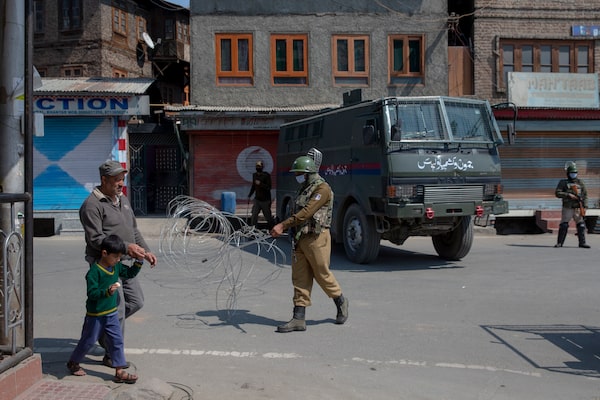
An Indian paramilitary soldier removes barbed wire to let a Kashmiri man and a child pass as restrictions are imposed on the movement of people after the first person in the region tested positive for COVID-19, in Srinagar, Indian controlled Kashmir, on March 19, 2020.Dar Yasin/The Associated Press
India banned incoming international flights on Thursday, restricted public gatherings and blocked roads to seal Kashmir after the insurgency-torn region reported its first coronavirus infection.
Elsewhere in densely populated South Asia, Sri Lanka postponed parliamentary elections as the coronavirus epidemic spread in an area that had been relatively unscathed compared to elsewhere in the world.
New cases in India, Pakistan and Sri Lanka are all accelerating, with the total across the region nearing 700. Six people have died.
Authorities worry that these countries could be especially at risk should the virus begin to spread locally, due to poor health facilities and infrastructure.
India, the world’s second most populous country after China, said it would ban all international commercial passenger flights from landing from Sunday for a week. The country has already suspended visas for the vast majority of foreigners seeking to enter.
In Indian-ruled Kashmir, claimed in whole but ruled in part by both India and Pakistan, dozens of people told Reuters they had been prevented from leaving their neighbourhoods by police and paramilitary units.
Srinagar’s senior superintendent of police, Haseeb Mughal, told Reuters that road blockades across the valley had been imposed to prevent the spread of the virus.
“I had to take my mother to hospital in Srinagar but the police closed the road,” said Mohammed Ayub, from the nearby town of Budgam.
“I am waiting here for the last two hours. I can’t even go home now as the road is blocked due to a traffic jam.”
Muslim-majority Kashmir has been relatively unaffected by the virus, reporting its first case on Wednesday. But the picturesque valley of seven million is one of most militarized places on earth due a decades-long insurgency against Indian rule and its residents have been subject to prolonged curbs on movement.
An internet shutdown that began in August following sweeping constitutional changes in Kashmir has only just been eased.
ELECTION SHELVED
Sri Lanka said on Thursday it would delay parliamentary elections scheduled for April 25.
The island country banned all incoming flights for two weeks effective Wednesday and imposed a curfew in some areas. There have been 53 confirmed cases in Sri Lanka.
Confirmed cases in Afghanistan remained static at 22 on Thursday, despite what experts say is a brewing crisis in the war-torn country, especially in Herat province bordering Iran, one of the worst affected countries.
In India, several areas introduced curbs on gatherings as coronavirus cases rose to 166.
Late on Wednesday, the desert state of Rajasthan invoked colonial-era laws that prevent the unlawful assembly of four or more people – powers more often used to quell riots.
Similar restrictions were introduced in Noida, a satellite city of New Delhi.
The financial hub of Mumbai expanded its partial shutdown of offices to government buildings on Thursday, with at least half the staff ordered to work from home.
Online retailers say they are struggling to keep up with demand as consumers stockpile supplies.
“We are seeing unprecedented order volumes in all cities in India,” Hari Menon, chief executive of online grocery retailer BigBasket, said.
The spread of the virus continued to hit markets and companies across the region. The Indian and Sri Lankan currencies both fell to a record lows against the U.S. dollar, with Pakistan stocks hitting their lowest level in five years.
Indian airline IndiGo said it would cut the salaries of most of its staff, while rivals SpiceJet and Vistara suspended international flights.
Since emerging late last year in the Chinese city of Wuhan, the flu-like coronavirus has infected more than 218,000 people and killed nearly 9,000.
The spread of the novel coronavirus that causes COVID-19 continues, with more cases diagnosed in Canada. The Globe offers the dos and don'ts to help slow or stop the spread of the virus in your community.
The Globe and Mail
Sign up for the Coronavirus Update newsletter to read the day’s essential coronavirus news, features and explainers written by Globe reporters.